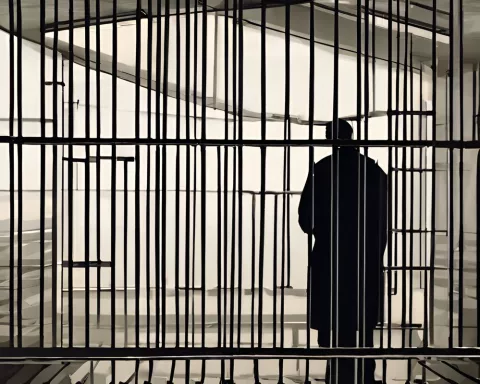Oscar Pistorius has been released from prison after serving more than eight years for the murder of his girlfriend, Reeva Steenkamp. His return to society has sparked mixed reactions from the public, with some sympathizing with him and others expressing outrage. Social media users have also criticized his physical appearance after prison, with some empathizing with Steenkamp’s mother and others arguing that Pistorius deserves a second chance. Despite the polarizing views surrounding him, Pistorius is forbidden from making any public statements until 2029.
What has been the public reception of Oscar Pistorius’ release from prison?
The release of Oscar Pistorius from prison has generated varied responses from the public. While some sympathize with him and argue that he deserves a second chance, others express outrage and criticize his freedom. His physical appearance after prison has also triggered negative reactions on social media. The narrative of Pistorius is a convoluted one, and the court of public opinion continues to pass judgment on him.
Oscar Pistorius’ Freedom and Public Reception
The renowned Paralympian, Oscar Pistorius, has been at the center of recent public discourse. After serving more than eight years behind bars, he was released earlier this year and has since returned to his home in Pretoria. In 2013, Pistorius was found guilty of murdering his girlfriend, Reeva Steenkamp, a conviction that led to his lengthy imprisonment. His re-emergence into society has generated varied responses from the public.
Later images of Pistorius circulating on social media platforms revealed him for the first time after his release, on a visit to the Pretoria parole office. The significant physical impact of his time in prison was quite evident. The previously athletic Pistorius has lost considerable weight, his once-vibrant hair now thin and graying. His face displayed a grave maturity, a stark contrast to his previous vibrant persona during his athletic prime.
Pistorius’ Rehabilitation and Public Backlash
Media reports suggest that Pistorius has been rigorously working towards physical recovery. He adheres to a stringent exercise routine and has given up alcohol. His lifestyle must now be in accordance with several conditions stipulated by Atteridgeville Correction Services officials. These conditions form part of his parole, which is set to last until 2029.
However, his images have triggered a significant negative reaction on social media platforms. Many criticized the sight of him appearing to be content. Several tweets were posted in response to his release, some sympathizing with Steenkamp’s mother, while others expressing outrage. These reactions underscore the polarizing views that revolve around Pistorius.
Twitter users like @DQuilici1 and @Mxbeez commented on the physical manifestations of his time in prison. Meanwhile, @Sylvia75143393 expressed empathy for Steenkamp’s mother, and @MONAMASTERS voiced anger at Pistorius’s freedom.
Despite the criticism, there were also those who sympathized with Pistorius, arguing that he had fulfilled his sentence and deserved a second chance. Twitter users like @Dumehlezii and @General_Sport7 were among those who expressed such views.
Public Opinion and the Future of Pistorius
The Daily Mail UK published a report where a friend of Reeva Steenkamp expressed her unease upon seeing Pistorius’s smile. Her feelings echo the indignation of those who resist the idea of Pistorius returning to a normal life. She stated, “If I had the power, I would erase that smile from his face. I can’t comprehend how he can sleep peacefully after what he has done.”
Under the terms of his parole, Pistorius is forbidden from making any public statements until 2029. As a result, the conversation is essentially one-sided, with public opinions on his guilt, punishment, and reintegration into society forming the dominant narrative.
The narrative of Oscar Pistorius is a convoluted one. He once basked in the glory of his Paralympian status, only to later become notorious for a dreadful act of violence. Today, he roams the streets of Pretoria as a free man, a change that has sparked a gamut of reactions. Even though he has served his prison term, the court of public opinion continues to pass judgment on him.
What are the conditions of Pistorius’ parole?
Pistorius’ parole comes with several conditions set by Atteridgeville Correction Services officials. He must adhere to a stringent exercise routine, give up alcohol, and live within a specific location. He is also forbidden from making public statements until 2029.
What is the Daily Mail UK report about Pistorius’ release from prison?
The Daily Mail UK published a report quoting a friend of Reeva Steenkamp expressing her unease upon seeing Pistorius’s smile after his release from prison. She stated that she would erase that smile from his face and could not comprehend how he could sleep peacefully after what he had done.
How has Pistorius’ physical appearance changed after prison?
Images of Pistorius after his release from prison have circulated on social media platforms, revealing significant physical changes. He has lost considerable weight, his hair is now thin and graying, and his face displays a grave maturity.
What is the public opinion on Pistorius’ rehabilitation and release?
Public opinion on Pistorius’ rehabilitation and release is polarizing. Some sympathize with him, arguing that he has fulfilled his sentence and deserves a second chance. Others express outrage, criticizing his freedom and empathizing with Steenkamp’s mother. The court of public opinion continues to pass judgment on him.
What is Pistorius’ parole duration?
Pistorius’ parole duration is until 2029. He is forbidden from making any public statements until then and must adhere to several conditions set by Atteridgeville Correction Services officials.
What is the narrative of Oscar Pistorius?
The narrative of Oscar Pistorius is a convoluted one. He once enjoyed the glory of his Paralympian status, only to become notorious for a dreadful act of violence. The court of public opinion continues to pass judgment on him, even though he has served his prison term.












